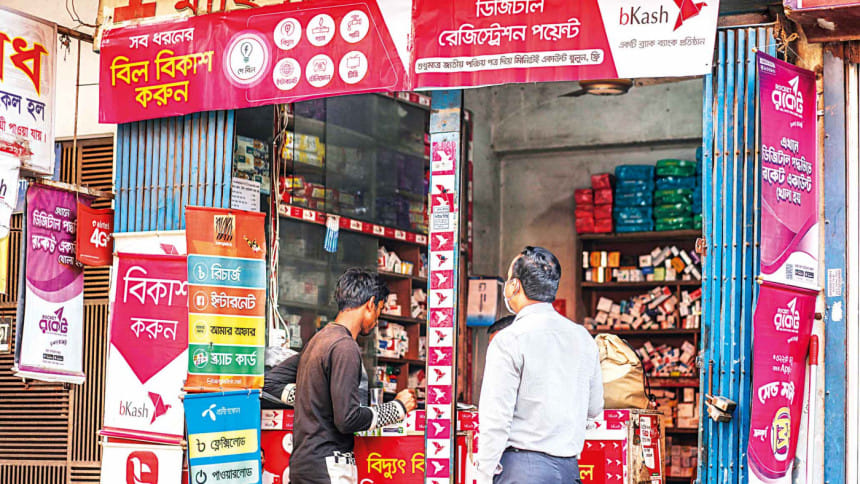The future of mobile financial services in Bangladesh

Mobile financial services are already growing at a fast clip in Bangladesh. If interoperability among operators and compliance is ensured, the service's cost is brought down, and a level-playing field is guaranteed, the industry will reach a new height.
The industry has emerged as a one-stop solution for all kinds of transactions, from sending and receiving money to making payments for utility, transportation, education, medical, and retail bills. This innovation has accelerated financial inclusion.
The World Bank estimates that, in 2017, 50 percent of adults had an account in their name with a full-service financial institution. This shows a 56 percent increase from 2011, according to a case study of the Alliance for Financial Inclusion (AFI), the world's leading organisation on financial inclusion policy and regulation, based in Kuala Lumpur. This increase is mostly due to the introduction and expansion of MFS since 2014. The government's efforts to register SIM cards in 2015 have also contributed to the sustained growth in mobile money access and user registration.
"The interoperability should be introduced on an urgent basis to take the industry to an elevated level," says Abul Kashem Md Shirin, managing director and CEO of Dutch-Bangla Bank Ltd, which owns Rocket, the country's first MFS operator.
"The sky is the limit," says Tanvir A Mishuk, managing director of Nagad, the MFS operator of the postal department, while speaking about the industry's potential.
Sydul Haque Khandaker, managing director of UCB Fintech Ltd, said that there is a tremendous growth potential for mobile financial services in Bangladesh amid the growing adoption of digital financial services, ranging from personal fund transfer to merchant payment, utilities to disbursement of various government allowances and stipends.
"Due to the momentum gained in the last decade, practitioners are now looking at the immense potential in MFS," shares Sheikh Md Monirul Islam, chief external and corporate affairs officer of bKash.
Abul Kashem Md Shirin also mentioned that the cost per Tk 1,000 cash-out must be brought down to a single-digit from Tk 20 now. The central bank recently published a circular that allows small businesses that don't have trade licenses and privately-owned businesses to open merchant accounts with MFS operators. As a result, small businesses such as grocers across the country can open the account and accept digital payments.
"Once small merchants start accepting digital payments in a big way, and people use mobile wallets to buy things and make payments more and more, the transaction volume will jump massively," says Tanvir A Mishuk. Currently, on average, Tk 50,000 crore is being transacted through this mobile money channel every month, and Mishuk mentioned this is just the tip of the iceberg.
Sydul Haque Khandaker praised the Bangladesh Bank for introducing personal retail accounts for micro-entrepreneurs: "There is a big prospect in this segment."
Moreover, the MFS platform can also be used as a channel for other businesses such as banks, microfinance institutions, NGOs, and insurances to offer financial products such as loan disbursement and collections, deposit instalment payment, and insurance premium, according to Khandaker. "It will reduce the cost of the services as well as increase efficiency," he says.
He also added that personal fund transfers and cash-out from the wallet still dominate the market. But significant opportunities lie in SME business, utility payment, e-commerce and F-commerce purchase, payment for digital content, and various government disbursements.
Mishuk gave full credit to the government for the growth of the MFS industry: "The government is very pro-active and open to suggestions from the private sector; this is helping the industry grow."
Islam of bKash said that MFS is a part of the Fintech revolution, and technology is the key driving force behind this sector's growth. "It is the foremost duty of the MFS providers to keep their customers' funds risk-free by investing in IT infrastructure and cybersecurity. On top of that, integration of new technology such as artificial intelligence, blockchain technology, virtual reality and machine learning, and internet of things remains to be of the essence to help the MFS industry reach new frontiers," he shares.
He also mentioned that the regulators' support and supervision were fundamental to the inception and growth of the MFS industry. The regulatory environment of Bangladesh is conducive to continued nurturing of MFS industry for its sustainable growth. "The remarkable growth of the MFS industry will be severely hampered if the compliance discipline is not identically supervised and maintained across the entire MFS industry," he adds.
A global survey by the International Monetary Fund with more than 70 stakeholders — Fintech firms, central banks, regulatory bodies, and banks — revealed that regulators need to keep up with fast-paced technological changes in Fintech to ensure consumer and data protection, cybersecurity, and interoperability across users and national borders.
According to Khandaker, digital literacy and customer awareness are a must to keep MFS customers safe and boost their confidence. There are challenges such as lower penetration of smart devices — smartphone penetration is less than 30 percent. Mishuk said that the price of smartphones has to be brought down, and the cost of internet usage has to be reduced. The issue of the digital divide would have to be addressed. He also mentioned that interoperability would allow operators to focus more on customer service and product innovations instead of competing for customer acquisition. According to Mishuk, this will "stop burning cash."

 For all latest news, follow The Daily Star's Google News channel.
For all latest news, follow The Daily Star's Google News channel. 



Comments